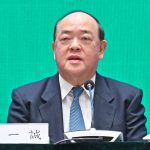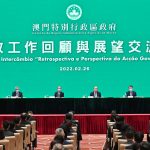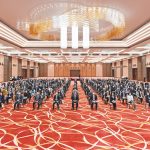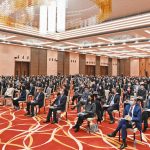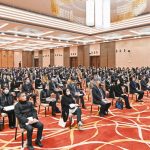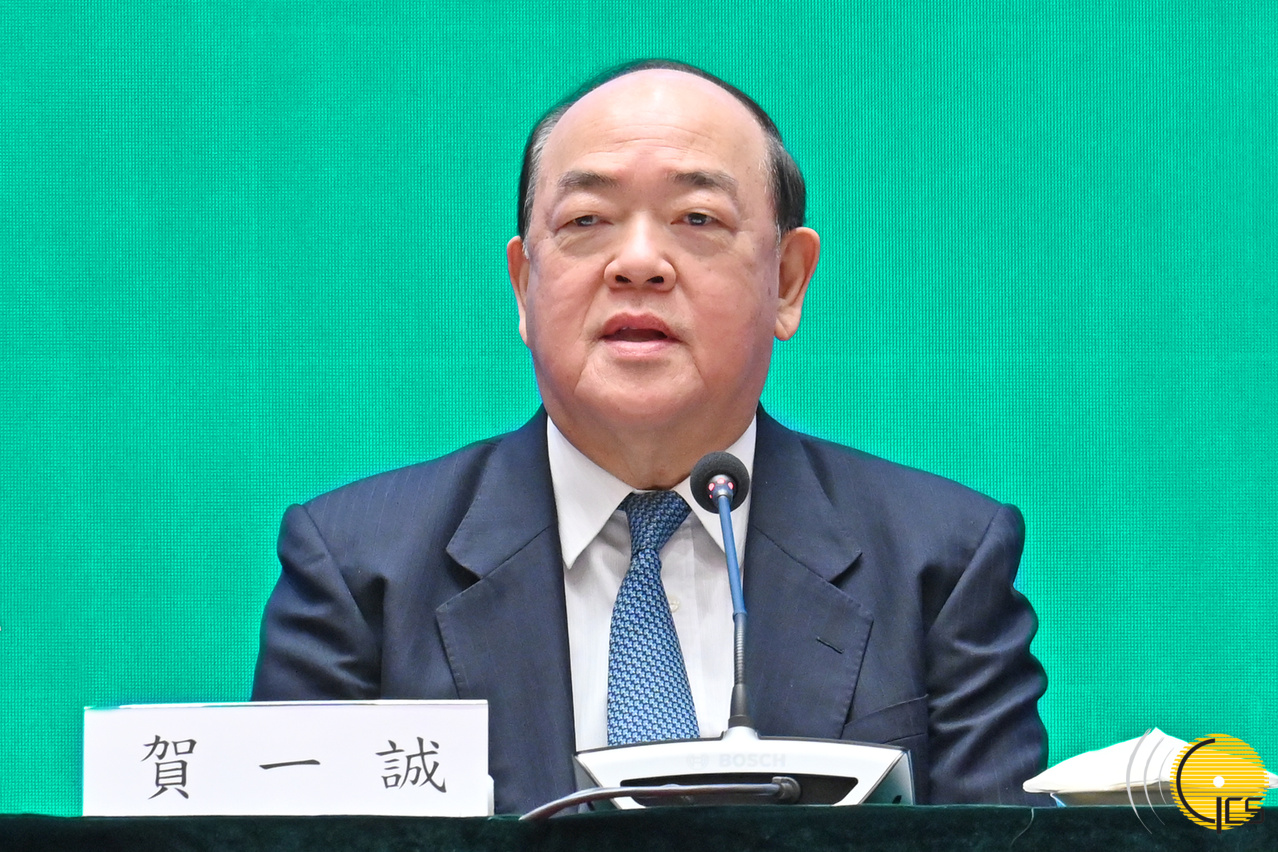 The Chief Executive, Mr Ho Iat Seng, speaks at an exchange session on the retrospect and prospect of the MSAR Government's works.
The Chief Executive, Mr Ho Iat Seng, speaks at an exchange session on the retrospect and prospect of the MSAR Government's works.
While reviewing the work done by the current-term Government during the past two years, the Chief Executive, Mr Ho Iat Seng, announced on Saturday (26 February) new requirements to develop and implement Government work. Such initiative upheld the spirit of the Central Government’s directives to Mr Ho during his duty visit to Beijing in 2021.
Mr Ho made the remarks in an exchange session to review and present perspectives regarding the Government's work. Some 280 officials took part in the session, held at the China-Portuguese-speaking Countries Commercial and Trade Service Platform Complex. They included the Government's principal officials; chiefs-of-office and advisors serving respectively the Chief Executive’s Office and the offices of the Government secretaries; directorate-level officials; and officials appointed by the Macao Special Administrative Region (MSAR) Government to work in the Guangdong-Macao Intensive Cooperation Zone in Hengqin.
During the meeting, Secretary for Administration and Justice Mr Cheong Weng Chon; Secretary for Economy and Finance Mr Lei Wai Nong, Secretary for Security Mr Wong Sio Chak, Secretary for Social Affairs and Culture Ms Ao Ieong U; and Secretary for Transport and Public Works Mr Raimundo do Rosário, each gave a presentation on the work to be carried out in the remainder of 2022 regarding their respective policy portfolios, and relevant arrangements to implement such effort.
Secretary Cheong said the administration and justice teams had, over the past two years, worked diligently to promote the integration of different public services, and spared no effort regarding reforming autonomous funds. In 2022, a 2.0 version of the "One-stop Public Services electronic account" would be launched, with the aim to build an integrated service platform for the general public and the city’s businesses, as well as to promote further electronic government services, based on the needs of users. In addition, the MSAR Government would continue to implement a three-tier prevention approach in the frozen-food chain industry, as a measure to prevent the spread of COVID-19 in the local community.
Secretary Lei said the COVID-19 pandemic had created considerable challenges to Macao. He detailed how the MSAR Government had stepped up its support to the local community, via provision of financial subsidies to Macao residents and the city’s businesses, and subsidised training for job-seekers. In the remainder of 2022, the economy and finance teams would bolster efforts in the mainland to promote Macao as a safe and quality tourism destination. Further effort would be made to deepen the cross-over effects of the "tourism+" public policy, namely with the MICE sector, sports industry, e-commerce, and cultural and creative industries. The MSAR Government would also devote further effort to integrate the "big health" industry and the tourism sector; to launch a number of tourism products; and to accelerate development of a modern financial services industry.
Secretary Wong said the MSAR Government had advanced its effort regarding promoting national security by improving several legal provisions and setting up a specific mechanism tasked with safeguarding national security. The public security authorities had showed unrelenting effort in the fight against all types of crime, and to ensure the safety of the community, while supporting firmly the MSAR Government’s overall anti-epidemic strategy. In the remaining months of 2022, the public security authorities would make all-out effort to optimise work based on nine key actions: safeguard national security; step up enforcement effort and planning; modernise the civil protection mechanism; developing the police team; promote further the use of technology and science in police work; deepen police-public cooperation; enhance management of cross-boundary checkpoints; optimise correctional services; and promote financial intelligence.
Secretary Ao Ieong said Macao should be highly vigilant and cautious regarding risk of a COVID-19 outbreak in the community, in view of the severe situation in Hong Kong. She detailed the MSAR Government’s anti-epidemic work in the past two years. Such effort included the launch and optimisation of the Macao Health Code system, namely the introduction of a venue code function; the management of medical observation hotels; and all related epidemiological investigation work. She also said the cultural and social affairs teams would continue to implement all projects that had been planned to ensure people’s livelihoods; optimise the allocation of educational resources; promote a market-oriented development of the city’s tertiary education; formulate a bill regarding a system for importing talented people; and strengthen work to ensure the protection and preservation of the Historic Centre of Macao.
Secretary Rosário said the MSAR Government had increased investment in large-scale infrastructure projects, in order to help stabilise the local economy amid the COVID-19 pandemic. He gave an update on the progress regarding construction of Government offices in a number of land plots. Noting that public transport was the topic that most concerned the Macao public, the Secretary said works related to the “Macao Road Traffic and Transport Planning Study (2021-2030)” would commence this year. He also shared insights on how to integrate the city’s pedestrian and recreational areas, light rapid transit (LRT) system, and bus network, in a bid to promote sustainable commuting.
In a speech concluding the event, the Chief Executive said that over his first two years in office, the current-term Government had enhanced its ability to think strategically, while public administration services had pressed ahead with work linked to promoting adequate economic diversification. Such efforts had been fully affirmed by President Xi Jinping and the Central Government, highlighted Mr Ho.
He added that the MSAR Government should review its work on a regular basis, in order to improve policy planning by identifying potential shortcomings and overcoming eventual challenges.
The year 2022 was a crucial period for Macao to grasp firmly the opportunities arising from the country’s development, noted Mr Ho. The MSAR Government would devote all-out effort to realising important instructions from the Central Government, advancing anti-epidemic work, and enabling the full resumption of social and economic life following the impact of the pandemic. That was to be achieved in partnership with the local community, he said.
The MSAR Government would follow closely its general principles of administration for 2022, i.e., “prevent the pandemic, stabilise economic recovery, protect livelihoods, promote diversification, strengthen cooperation, and explore development opportunities".
Further effort should be made to expedite the establishment of the Guangdong-Macao Intensive Cooperation Zone in Hengqin, said Mr Ho. He added that the Government should venture into promoting innovation regarding existing institutions, mechanisms and systems, in order to further integrate Macao into the overall national development. Local authorities should do their best to improve the quality of the city’s development and to not disappoint the Central Government, following the care and concern it had shown for Macao.
In today’s session, the Chief Executive shared with participants four key points to optimise the Government’s work.
1. Devote unrelenting effort to speeding up the city’s adequate economic diversification and to deepen anti-epidemic work.
Adequate economic diversification was of utmost importance for the MSAR Government. Revision work related to Law no. 16/2001 “Legal Framework for the Operations of Casino Games of Fortune” would be continued this year; and the MSAR Government would devote additional effort to consolidate the advantages of the city’s traditional industries. In addition, further effort would be made to: foster the development of a ‘big health’ industry, with traditional Chinese medicine research and development as an entry point; expedite development of modern financial services; promote high and new technology industries; and ensure development of cultural tourism, convention and exhibition, sports, and commercial and trade industries. Advances had to be made in these areas, in order to spur Macao’s economic development.
Regarding anti-epidemic effort, the MSAR Government would remain vigilant, work stringently to maintain the city’s anti-pandemic mechanisms, and remain as prudent as at the beginning of the pandemic. Further effort would be made to enhance joint epidemic prevention and control mechanisms with regional partners.
2. Constantly optimise social and livelihood-related work, and enhance digital public services.
The Government should persist with people-oriented policies, while continued efforts should be made to resolve issues regarding housing, healthcare, education, care for senior citizens, and employment opportunities for local residents. It should strengthen development of public infrastructure, enhance the quality of support services for the community, and respond actively to demands from the public. Advancing digital public services was a policy goal of the Government to provide the public with greater convenience in accessing public services.
3. Pragmatically promote the development of the Guangdong-Macao Intensive Cooperation Zone in Hengqin, and proactively engage Macao in the country’s overall development.
Work for advancing the Cooperation Zone had to be conducted in coordination with the original purpose of helping to diversify Macao’s economy, and in line with four strategic positions, i.e., a new platform for promoting Macao’s adequate economic diversification; a new space in which Macao residents could live and work; a new showcase to enrich the implementation of the “One country, two systems” principle; and new and high-level grounds for promoting development of the Guangdong-Hong Kong-Macao Greater Bay Area.
In order to ensure the integration of Macao into overall national development, the city’s roles, positioning and strengths would be maximised, to serve the country’s ‘dual-circulation’ development pattern for the economy.
4. Keep enhancing the quality of governance and promote coordinated planning of legislation.
All public departments had to strengthen their political awareness and responsibilities. Further effort should be devoted to ensuring social stability and the security of the nation, which were the premises for economic development. Adherence to law-based governance was a fundamental principle of the MSAR. In addition, team spirit within governmental departments and cross-departmental communication should be encouraged, while inviting greater participation from the community in Government work, as these were helpful to push forward projects relating to people’s livelihoods.
The Chief Executive called on Government officials to study thoroughly the spirit from the important speeches by President Xi when he visited Macao. They should also have a better grasp of the master plan regarding the city’s development, and be able to expand their horizons, fulfil their duties, increase efficiency and complete their tasks, in order to ensure stability in Macao’s politics, economy and society.


